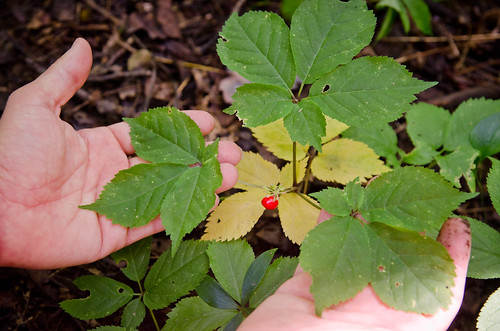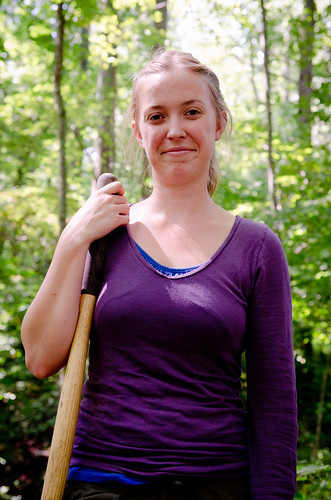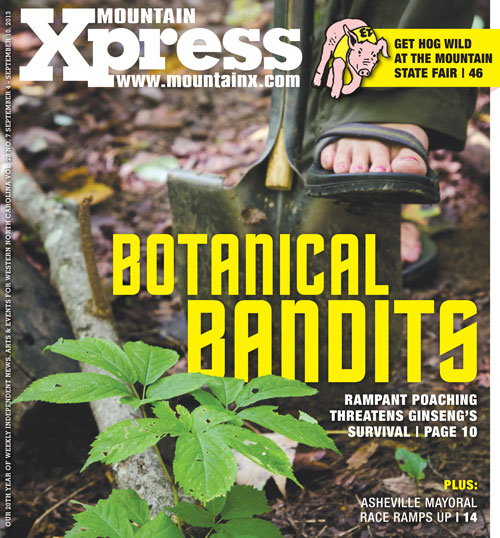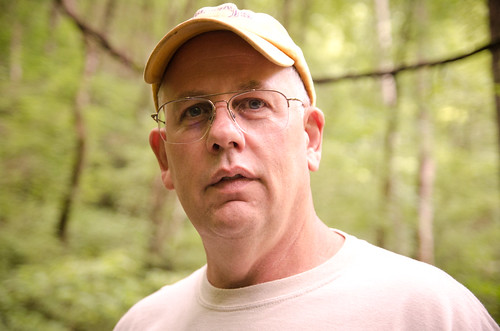Jim Corbin trudges up a steep hillside in the Great Smoky Mountains National Park hunting ginseng. Each year, thousands of people scour the damp coves of Western North Carolina’s hardwood forests in search of the valuable herb; unlike most of them, however, Corbin isn’t driven by profit.
Instead of big collection bags, the plant-protection specialist and his 12 colleagues from the N.C. Department of Agriculture are armed only with small bottles of powdered yellow dye. On this cool morning, they spread out, painstakingly combing a slope that rises above the Oconaluftee River. Eventually they find a few of the leafy green perennials, dig them up and sprinkle dye on their roots.
They’ll continue this backcountry slog for the next several days, hoping to stain thousands of plants with the harmless dye to discourage poachers. Dealers, says Corbin, are alerted not to buy dyed roots, and the Department of Agriculture can test for the dye even if it’s been scrubbed off. It’s just one of many maneuvers in an ongoing battle to protect the species from extinction and find sustainable ways to harness its medicinal properties and economic potential.
But with wild ginseng root fetching upward of $800 a pound, untold numbers of poachers have taken to local forests, overwhelming meager law enforcement resources and leaving the plant’s survival in doubt.
Last year, Buncombe County led the state in ginseng production, with 1,268 pounds of dried roots, the Department of Agriculture reports. Haywood County came in second, with 1,074 pounds. Almost all of the 8,994 pounds harvested statewide came from WNC and eventually made its way to China. The state agency has no way to determine exactly how much of that was illegally harvested, but at $800 a pound, that translates into more than $7.1 million going into the pockets of those rummaging the hillsides.
Root of the problem
The Chinese have used ginseng for thousands of years to promote longevity, relieve stress and treat various ailments. The Cherokee are believed to have used wild American ginseng for similar purposes, and it’s been shipped to China since the early 18th century. Panax ginseng, its wild Asian relative, has long been virtually extinct due to deforestation and overharvesting, though large-scale Chinese farms continue to cultivate a much less potent variety.
But “digging sang” was part of traditional Appalachian culture long before the current booming Chinese market started driving local ginseng prices sky high.
“It’s just something you heard of your grandpa doing, your dad doing, and you know, it’s just what you do,” says Josh Wallen, a lifelong Fairview resident. “You grow up fishing and hunting and spending a lot of time in the woods around here, you just naturally started digging it when you saw it. So it’s just something you get handed down.”
“Most people who know about digging ginseng were born and raised around these mountains … kind of like mountain men or hillbillies, if that’s what you want to call it,” he continues. “Making money to spend time in the woods? It don’t get much funner than that.”
But harvesting ginseng is illegal on national parkland, and on private property you must have the landowner’s permission.
Each September, the U.S. Forest Service sets a legal harvesting period for the Pisgah and Nantahala national forests, issuing permits that specify how much can be gathered. This year, the agency slashed the normal four-week season to two (Sept. 1-15) and issued just 136 permits through a lottery system, a 75 percent reduction from 2012. Each permit holder can gather up to 3 pounds.
“Dramatic declines of wild ginseng populations over the past decade suggest previous harvest levels are no longer sustainable,” Forest Supervisor Kristin Bail explained in a June 20 press release announcing the changes. “It is in everyone’s best interest to further limit the amount of the harvest to help ensure the plant’s future sustainability.”
But it’s unclear how much difference those restrictions will make. Freely admitting that he’s never applied for a permit himself or sought permission from landowners, Wallen speculates that less than 10 percent of his fellow diggers ever bother going through the permitting process.
“I’ve always considered it Christmas money,” he reveals, adding that over the years he’s earned enough from ginseng harvesting to buy two trucks, a four-wheeler and more.
Most folks, he says, “walk for days and don’t even worry about whose property they’re on. Generally it’s easier to ask for forgiveness than to ask for permission.”
“I’ve had a couple people run me off, no doubt,” he continues. “I’ve had a couple people call the law on me and stuff. But you don’t stick around long enough to find out. You just turn your back to them and walk off in the woods.”
Botanical banditry
Brad Stanback owns a remote tract of land that straddles the Buncombe/Haywood County line in the Newfound Mountains. He says he’s called law enforcement to report ginseng poachers on his property many times, to little effect. For 20 years, the environmentalist says, he planted ginseng on his land in a way that simulated wild growth conditions, a practice advocated by preservationists.
“After a while, I just started finding muddy holes in the ground and not finding the plants I’d planted before,” he reports. In 2010, Stanback installed cameras in the woods surrounding his home.
“I was shocked to see how many ginseng poachers were crawling around my property, usually dressed in camouflage,” he continues.
“There was one group coming and going for three days. I think they were camping on my property, and hiking in and out, to dig ginseng.”
Slideshow photos courtesy of Brad Stanback, who alleges that they document people trespassing and poaching ginseng on his property along the Buncombe/Haywood County line.
With U.S. Fish and Wildlife Service agents’ jurisdiction limited to public property, they referred Stanback to local sheriffs’ departments. After a lengthy ordeal in which he tried to gather evidence and talked to various law-enforcement officials and lawyers, Stanback says most of the poachers on his land got away scot-free, though a couple were given warnings and one a small fine.
“There was no way to effectively prosecute them, even when I had the photos,” he maintains. “It’s just not taken seriously.”
In fact, continues Stanback, his lawyer advised him “to just give up on it, because if you have any effective way of stopping these people, they may come burn your house down to get even with you.”
Happily, it never came to that, but Stanback says he does blame poachers for assorted “dirty tricks,” such as his livestock being mysteriously let loose and his hose being turned on, flooding his patio.
“My wife and daughter definitely felt physically endangered,” he reports. Disheartened, Stanback has given up growing ginseng and no longer keeps close tabs on his property, speculating that all the plants he grew have been stolen by now anyway.
Robert Eidus, who owns the North Carolina Ginseng & Goldenseal Co., is one of 54 licensed ginseng dealers in the state who buy roots from diggers and resell them at a profit. But unless the roots have been dyed, he says there’s no way for him to determine where the ginseng he buys comes from. State law, notes Eidus, requires harvesters to fill out paperwork indicating where they collected the plants, but “They can lie through their teeth, and I wouldn’t know it.
“Most of the time, it’s, ‘Oh, it’s my family’s land,’” he reports. “These guys feel like they’re outlaws. … They’re not making a lot of money compared to the amount of work they’re putting in; it’s just that they don’t have to punch a clock 9 to 5 like you do.”
“I’m allowed to buy from people who steal from other people,” adds Eidus. “It’s the last illegal, sanctioned business in America.”
Cat-and-mouse game
Enforcing ginseng laws, says Eidus, is “a hot potato, so everyone passes the buck.” A victim of poaching himself at his Madison County farm, Eidus echoes Stanback’s experience, asserting, “Usually when you call up the sheriffs, they’re totally useless.”
Natalie Bailey, public information officer at the Buncombe County Sheriff’s Office, referred this reporter to state and federal authorities, saying her agency hasn’t received any calls this year from property owners complaining about ginseng poaching.
Tom Chisdock, an Asheville-based special agent with the U.S. Fish & Wildlife Service’s Office of Law Enforcement, maintains that steps are being taken to deal with the problem on public lands. But his office, he notes, is “constantly being challenged by shrinking numbers.” Since 2002, the number of agents has declined from five to one, making Chisdock the only such enforcement agent remaining in the state.
“While that might sound bleak, I just have to work smarter,” he observes. Asked for an example of recent success, he cites the high-profile 2010 bust of Johnny Grooms, who was convicted in a Greeneville, Tenn., court of trading prescription painkillers for more than 30 pounds of illegally harvested ginseng.
Meanwhile, the N.C. Department of Agriculture website ominously warns: “Removing any plant or its parts from national forest land without a permit is considered theft. Every national forest plant is public property, which means plant thieves are robbing taxpayers of a resource that is collectively owned. Penalties for plant poaching may include a fine up to $5,000 or sentence in a federal prison, or both.”
Nonetheless, says Chisdock, poaching “appears to be ever increasing. That’s mainly because of the financial rewards, whether that’s due to tough economic times or folks just trying to make a living. Unfortunately, the market is like a cat-and-mouse game. You slow down one segment and another takes over.”
Seeds of change

Unlike most local ginseng dealers, Eidus says he sells only to American consumers, mostly Asian-Americans in bigger cities, though his roots are also readily available at the French Broad Food Co-op in downtown Asheville. And with growing domestic interest in Chinese medicine and alternative health care, he sees “huge potential” in the U.S. market.
But with wild supplies dwindling, Eidus and others are looking to what’s called woodland cultivation. The large-scale industrial ginseng farms found in China and in states like Wisconsin, he explains, rely on artificial shading, soil fertilization and pesticides. Eidus, on the other hand, is helping organize the N.C. Ginseng Association, encouraging local farmers to use an organic approach that replicates wild conditions.
Traditionally farmed ginseng sells for only $18 to $24 a pound and contains far lower levels of medicinal ginsenosides than its wild relatives. But wild-simulated plants have the potential to match the levels of ginsenosides found in wild plants, says Alison Dressler, research associate at the Mountain Horticultural Crops Research & Extension Center in Mills River. More testing is needed, she notes, but her organization is helping locals turn their empty wood lots into profitable havens for ginseng and other botanicals such as goldenseal, black cohosh and bloodroot.
“Not only do we want to preserve these plants and provide people with supplemental income, we want to help them get better prices for this stuff,” says Dressler, adding that interest is on the rise. “You’re not going to get rich overnight doing this, but even a few thousand dollars a year to pay the taxes on your land makes a difference.” The biggest hurdle facing growers, she notes, is theft: Even experimental plots cultivated at undisclosed locations under the center’s care have been raided.

Meanwhile, Eidus says the N.C. Ginseng Association is getting better organized amid promising negotiations with one of the nation’s biggest herb distributors. Declining to reveal the West Coast company’s name, he says it’s interested in contracting with local woods farmers to grow thousands of pounds of ginseng roots per year for domestic consumption.
“We’re selling it to Americans for Americans. It’s almost revolutionary,” Eidus declares. “Other herb companies are also going to want to get in on it. If this gets going, it’ll bring other business our way.”
But he, too, says poaching is one of the biggest obstacles, noting that several farmers involved in the negotiations are loath to reveal their identity for fear of being robbed.
Increasing the association’s organizational and economic clout, Eidus believes, will lead to more respect for the industry, police protection, crop insurance and money for high-tech security measures such as GPS tracking systems.
“People need to be protected. It’s a crop,” he points out. “This is the way we should be going.”
Even Wallen says the situation in local forests is getting so dire that he’s thinking about changing his ways in order to preserve his beloved tradition.
“In my opinion, we need to tighten up the laws,” he asserts. “People are raping the woods for this stuff, bad. I love money; I love digging ginseng. I love it as much as I love breathing air: I’ve done it my whole life. … But I love our nature better.
“I want to be able to take my kids to the woods to dig ginseng,” says Wallen, adding, “Once it’s gone, it’s gone.”









Is there a way to do this story without a) telling people how much they can get for ginseng, b) telling them where it grows, and c) putting a damn picture of it on the cover, next to a shovel?!?
Just a thought…
You’re right. This is a veritable ‘How to Find and Poach Endangered Ginseng for Profit’.
Both XPress and the AC-T have been running this story over & over again for years. Each time, with a picture of the plant, and how much you can get for it. Do we think this has helped, or hurt, ginseng poaching?
Here it is again, less than two years ago:
http://www.mountainx.com/article/38143/Green-Scene-The-root-of-the-problem
Excellent article. Do you really think that poachers are going to get information from this article that they already don’t have? How silly. This article is meant for the rest of us–to inform us of the severity of the poaching problem — it’s not some quaint Appalachian folkway we can be amused by–it’s darn harmful. Keep writing informative articles like this.
“Do you really think that poachers are going to get information from this article that they already don’t have?” No, of course not. It’s about creating brand new poachers.
I was at work about 10 – 12 years ago when a similar article came out in the AC-T. When someone read it out loud, another co-worker went up & said “$1000 a pound? Let me see that!” He ripped out the photograph & walked away muttering about borrowing a shovel after work…
“Do you really think that poachers are going to get information from this article that they already don’t have?”
In some cases, yes they would.
“Keep writing informative articles like this.”
So if the article is “informative”, why do you think potential poachers would not find it so as well? That notion is what is “silly.”
Guys and gals; Let me tell you what. I’m born of east Tennessee Cherokee/Scottish blood. This land is mine. I have no fixed home but the mountains. If I find you in my home conducting illegal or immoral activities, you shall be judged accordingly. You are best served to learn the law of the land less become nameless amongst it. Boys, I’m’telling you; I know times are tough and we all have families to feed, but if you’re doing wrong by God’s earth, you will be punished…the Mountain way…
Just another example of America’s Brainwashed!If the Federal and State Government would bring JOBS back to western NC? Folks have to make some kind of $ and provide for there families! So if this WEED can do that? I say dig until you can’t dig anymore!And has far as getting punished the Mountain way? If I see you somewhere in the woods, I’ll dig a hole and put you in it and throw a few wild ginsing berries in the hole in with you!
China has been taking jobs from North Carolina and the rest of the U.S. for years. Greedy U.S. companies move their operations there or buy cheaply MADE products from there because a gazillion dollar a year profit for them isn’t enough. U.S. distributors should charge the Chinese buyers ten times what they charge now and pass some of that profit to the harvesters. The reason the North Carolina and Federal govt. wants it regulated better is so they can get their tax money. It’s a shame that a person who can barely feed their children and lives below or at the poverty level can’t harvest this plant without being harassed by the local, state and federal govts. Why don’t they open up more lands to ginseng harvesters. and just monitor it more carefully. Heck they could even buy the ginseng, sell it at a huge profit to China then turn around and put the money back into the public lands which in turn puts more money into the harvesters pockets so they can spend more money and help stimulate the economy. All this problem boils down to is the government wants to control us like puppets.
There should be a law passed that only allows permit holders to sell ginseng, in the same way tobacco is still sold. That’s the reason tobacco isn’t stolen and the dried leaves sold.
As temperatures continue to rise, it may be the best time to install solar panels on your home or business. Through proper design and installation of solar panels, you will be able to fight those rising electricity costs. Below are a few questions that you need to ask before installing residential or commercial Solar Panels Los Angeles.
Ray Ban 4147 Sunglasses http://adalskodun.is/reg/20158291653527074899.html